15—30 July 2021
Online
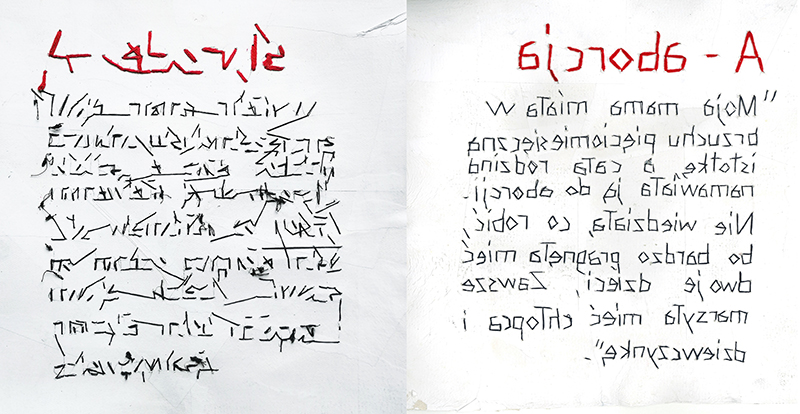
Viktoriia Tofan, A – aborcja (A- abortion), from the series Alfabet (Alphabet), 2021; a front and a back;
Canvas, reinforced paper, embroidery
Dimensions: 28,5x29,5 cm
Price on request by emailing info@almanacprojects.com
As the sixth correspondent for Love Letters, Astrid Korporaal and Basia Sliwinska invite Viktoriia Tofan. Support the All-Poland Women’s strike by purchasing the editions, and the artists through their works (by emailing info@almanacprojects.com).
In ‘the Laugh of Medusa’ (1976) Hélène Cixous writes that woman ‘must write her self’ to enact ‘ruptures and transformations in her history’. She says,
By writing her self, woman will return to the body which has been more than confiscated from her, which has been turned into the uncanny stranger on display-the ailing or dead figure, which so often turns out to be the nasty companion, the cause and location of inhibitions. Censor the body and you censor breath and speech at the same time. Write your self. Your body must be heard.
In her project Alphabet (2021) Viktoriia Tofan engages with the ecology of communication. Whose language do we speak and whose language shapes the narratives we subject ourselves to daily? Tofan practices alternative ways of listening and speaking when embroidering stories through cloth. Piercing through power structures within languages she questions: who is in command to speak and whose language is ‘our’ language? Whose language colonises others and affects their sense of belonging?
Tofan’s Alphabet continues her previous project in which she collected stories of deaf persons and recorded them on paper using embroidery as a method. As a Ukrainian living in Poland, she worked with the community of the deaf to explore issues connected to strangeness, foreignness, and marginalisation. When she was recording stories of Polish deaf persons discriminated against within their own culture, she also discovered the complexities inherent in learning written and spoken Polish by deaf Poles. As a migrant herself, she connected intimately to the violence embedded in assimilation and adjustment, further exacerbated by language. Making holes in paper when embroidering words from the collected stories, and connecting these via thread enabled her to engage with the specificity of sign languages, (mis-)communication and otherness. What is language for a person? This question led to the conceptualisation of a new alphabet and a new phonic language addressing issues of belonging and foreignness.
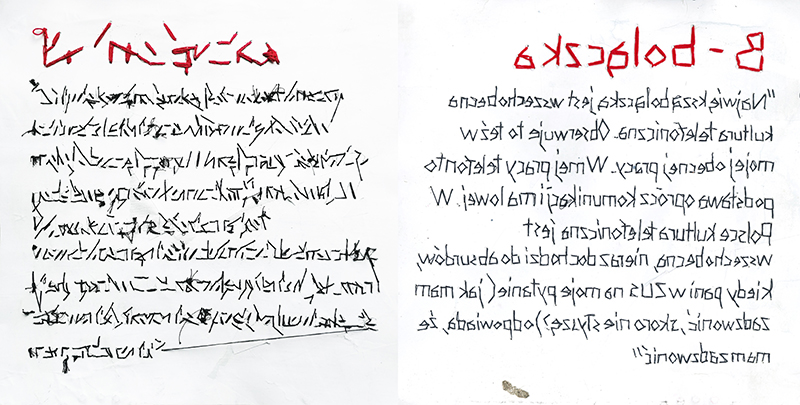
Viktoriia Tofan, B – bolączka (B – malady), from the series Alfabet (Alphabet), 2021; a front and a back;
Canvas, reinforced paper, embroidery
Dimensions: 28,5x29,5 cm
Price on request by emailing info@almanacprojects.com
Tofan violently stitches through reinforced paper, perforating it to tell a story. Her hand is brutal. Holding a needle and a thread she writes through paper to give agency to bodies that are silenced. The brutality of the gesture signifies the struggles in articulating one’s identity and attempts at overcoming difficulties in speech to become understood. Tofan’s alphabet is founded upon stories of deaf people so that, as Cixous said, their bodies can be heard. The imagined language is grounded in an ethics of care and attention. It offers a sense of security and comfort by creating a threshold space beyond dichotomies of deaf/hearing, migrant/native, us/them that prioritise one category of social difference over another. The word ethics derives from the Greek word ‘ethos’, meaning dwelling, as a noun meaning a place of return; and as a verb the practice of dwelling, a bodily act of occupying. Ethical language has the potential to enable one’s dwelling and to allow space for one’s embodied belonging within the world. Tofan’s alphabet pays attention to ways in which language has the potential to intervene into communal power relations towards belonging that is equal and democratic: where all voices are mutually constitutive. It activates belonging towards each other through dialogical engagement across differences and physical and metaphorical borders.
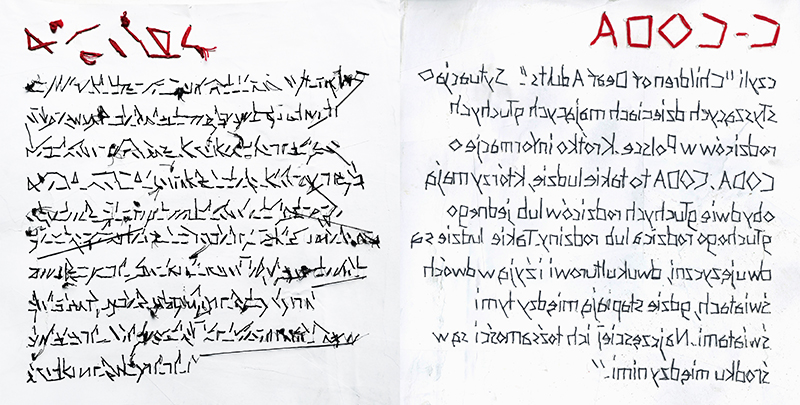
Viktoriia Tofan, C – CODA Children of Deaf Adults, from the series Alfabet (Alphabet), 2021; a front and a back;
Canvas, reinforced paper, embroidery
Dimensions: 28,5x29,5 cm
Price on request by emailing info@almanacprojects.com
The first text, abortion, reads ‘My mother had a 5-month-old person in her belly and the whole family was encouraging her to terminate the pregnancy. She always dreamt of having a daughter and a son.’ The second text addresses a malady; ‘The major malady of our times concerns phone culture. I notice this also in my place of work where, apart from email, the phone is the basis of all communications. In Poland, phone culture is ubiquitous and sometimes this results in absurd situations. For example, when asking one of the female customer relations officers at The Social Insurance Institution in Poland how can I call if I cannot hear, her answer was, please do call.’ The final text, CODA, relates to stories of Children of Deaf Adults (CODA). ‘CODA refers to people who have one or both deaf parents. They are bilingual and bi-cultural, living in two worlds which merge. Most often, their identities are in between those worlds.’
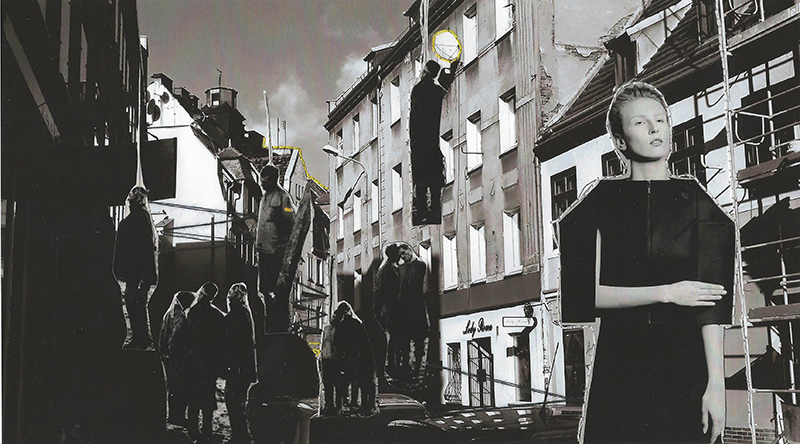
Viktoriia Tofan, Maszyna do mielenia (Grinding machine), 2018-2021
Collage: paper, thread, glue
Dimensions: 29,5x16,6 cm
Purchase by emailing info@almanacprojects.com
(50 EUR + postage and shipping)
As an edition, Tofan offers works that highlight another aspect of her practice: that of the collage. In these works, embroidery also plays a role, as threads suture together elements of the visual composition. These collages join urban environments, groups of people, scenes of violence and war, and simple tools or elements of construction. They seem to question the place of the body in an urban space. The jagged lines of embroidery echo the sharp architectural angles in a way that might cause us to wonder about the hospitality of both forms. Do they cover up violence, hiding it and also justifying its presence? The threads start to resemble barbed wire, or chains. At the same time, there is a correspondence between the act of sewing and the tools of creation and repair: the nuts, bolts, nails and hammers that are given a prominent role in these scenes. Is this, for better or worse, a reminder of the role of human hands in clothing the city and housing our bodies? The sharp tools of creation can be used as weapons and borders, segmenting space and people into the wanted and the unwanted. But they can also draw lines of intimacy and memory: to refuse the erasure of bodies from the space of history.
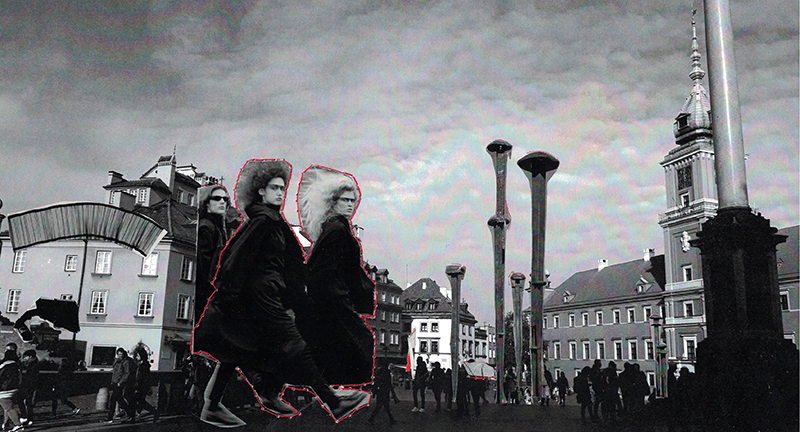
Viktoriia Tofan, Maszyna do mielenia (Grinding machine), 2018-2021
Collage: paper, thread, glue
Dimensions: 29,3x16,8 cm
Purchase by emailing info@almanacprojects.com
50 EUR + postage and shipping)
Bio
Viktoriia Tofan.Visual artist, born in 1993 in Dnipropetrovsk, Ukraine.
Viktoriia Tofan is a graduate of the Faculty of Painting at the Eugeniusz Geppert Academy of Fine Arts in Wrocław, Poland; and the Academy of Fine Arts in Kiev, Ukraine. She currently lives and works in Wrocław. Tofan explores the possibilities offered by language as a response to a profound sense of alienation, which she shares with deaf persons. Working with deaf people became foundational to the creation of a new alphabet and new phonic language. This new language is her new private homeland, offering a sense of belonging and 'spaciousness'. Language in this context becomes more than information sharing device – it is an affective space for emotions and forming a community open to difference. This private homeland is the starting point for communication which engages with communities through stories of people whose articulation does not inscribe into normative communication channels. Tofan uses embroidery to work with language and draw on the sensuality of this craft which is often associated with female labour. It also allows her to pay attention to the backside, which no one usually sees. Revealing the hidden reverse of the embroidered pieces visibilises language as a passport to a new homeland created by Tofan.